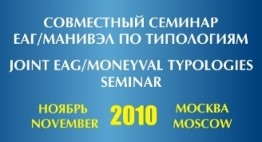-

10 November, 2010
The joint EAG / MONEYVAL typologies seminar started in Moscow on November 9.
Among the participants of the event are representatives from the EAG member-state financial intelligence units, law-enforcement and supervisory agencies as well as private sector institutions including financial institutions, Internet payment services providers and experts in information security.
On the agenda of the seminar are key ML/TF risks and tendencies by means of e-money and other Internet technologies which form the basiс subject of joint typologies research conducted by the EAG and MONEYVAL. Final results of the research will be presented for approval at the FSRBs Plenary meetings in December.
On the first day of the session a press briefing was held with participation of MONEYVAL Chairman Vladimir Nechaev, Head of economic crime division of Directorate of cooperation DGHR of COE Alexander Seger and Co-chair of the EAG Working group on mutual evaluations and legal issues Pavel Livadny.
The experts pointed out that rapid development of e-payments leads to further risks of misuse of Internet technologies for criminal purposes. This is mainly due to high speed of Internet transactions as well as various possibilities for conducting anonymous payments from any part of the world through cyberspace.
When talking to the journalists, Alexander Seger stated that cybercrime has no national boarders nor features which would be common for a particular country or region: stolen money are being easily transferred all over the world with a fascinating speed. According to Mr. Seger, international cooperation of the FIUs, law-enforcement agencies and supervisory bodies in collaboration with private sector gains great importance in preventing and investigating these crimes.
The participants of the seminar also drew attention to the anonymity of Internet transactions as one of the factors complicating countering cybercrime. Pavel Livadny underlined that comprehensive legislation should be in place to allow linking e-transactions to bank accounts. This will provide for regulating electronic payments without impacting their current advantages, including speed, for instance. According to Mr. Livadny measures are being taken by the EAG member states to introduce appropriate legal framework. In Russia, in particular, a law on national payment system is being developed which is supposed to create framework for combating cybercrime.
Elaborating unified approaches to regulating e-payments has become one of general priorities for the international community which is aware that fighting money laundering is now very closely connected with combating criminal flows on the Internet, - said Alexander Seger.
An important role in these processes is played by the FATF and FSRBs which research ML/TF typologies and devise recommendations on risk mitigation for the private sector. Broader engagement of private sector institutions including financial companies and e-payment services providers into global AML/CFT framework is necessary to ensure effective regulation of electronic transactions.
According to Pavel Livadny, it is possible to ensure transparency of financial transactions conducted with new payment methods only in cooperation of legislators, supervisory agencies and private sector institutions. In order to facilitate such cooperation the EAG holds consultations with private sector, typologies seminars, forums and conferences which provide a platform for discussing relevant issues and elaborating approaches and methodologies for risk assessment and mitigation in the Eurasian region.
Two sections worked on the first day of the seminar which focused on new threats imposed by the rise of cybercrime, pending issues of e-payment regulation, risks of misuse of non-traditional financial institutions and alternative remittance systems for ML/TF, etc.
The results of the seminar will be presented after November 10.

 Login to your account
Login to your account Eng
Eng Рус
Рус